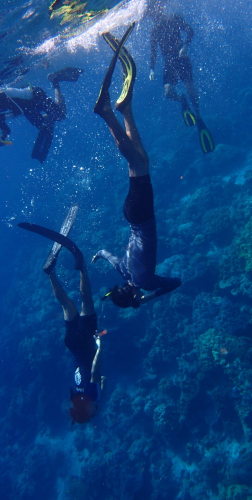Overview of Scuba Diving: Scuba diving is an exciting and daring sport that lets people explore the underwater environment. It has a long and fascinating history that spans several centuries, and mastering the fundamentals of scuba diving is essential to a fun & safe experience. Scuba diving has its roots in the 16th century, when Leonardo da Vinci developed a breathing apparatus for exploring beneath the surface of the ocean. Still, scuba diving remained out of reach for most people until the middle of the 20th century. Underwater exploration was revolutionized and extended underwater stays were made possible by Jacques-Yves Cousteau & Emile Gagnan’s invention of the Aqua-Lung.
Table of Contents
ToggleKey Takeaways
- Keeping a logbook is essential for tracking your progress and ensuring safety.
- Good judgment is crucial in making decisions while scuba diving.
- Listening to your guide is important for following safety protocols and discovering new dive sites.
- Buddy checks are necessary for ensuring that both you and your dive partner are prepared for the dive.
- Improving your buoyancy control will enhance your diving experience and protect the environment.
Scuba Diving Techniques
Acquiring fundamental knowledge of scuba diving techniques is crucial for guaranteeing divers’ safety. They include equalizing pressure, controlling buoyancy, communicating effectively, and breathing correctly. By becoming proficient in these areas, you can reduce the risks involved with diving while also improving the overall experience.

Maintain a Logbook: Keeping a logbook is a crucial but sometimes disregarded part of scuba diving. A dive logbook is a useful tool for keeping track of your dive experiences and gathering important information for subsequent dives. It lets you keep tabs on your development, pinpoint areas in need of work, and remember previous experiences. Maintaining a logbook is crucial for a number of reasons. In order to advance your diving certifications, it is crucial that you keep track of the number of dives you have completed. It also lets you log crucial information like dive sites, water quality, and sightings of marine life.
When organizing dive trips in the future or sharing your experiences with other divers, this information can be quite helpful. Make sure to record information in your logbook about the dive site name, dive date and time, water temperature, visibility, depth, duration, and any noteworthy observations or interactions. To further improve your logbook entries, you can also attach drawings or pictures. Always Make Good Decisions When it comes to scuba diving, making wise decisions is crucial. A safe and enjoyable dive or a potentially dangerous situation can be determined by making wise decisions prior to, during, and after the dive.
Consider your own level of mental and physical preparedness before diving. Make sure you are healthy, rested, and free of any medical conditions that could make you dangerous in the water. Also, you must make sure that all of your equipment is in good operating order by giving it a thorough inspection. Always stay aware of your surroundings during the dive, & base your decisions on your knowledge and expertise.
Refrain from overextending yourself or assuming unwarranted risks. It is preferable to safely surface after the dive if you run into any problems or doubts rather than taking a chance on an accident. Hearing Your Guide: It is very important to pay attention to your guide when diving in new places or with a new dive operator. Guides are seasoned experts with in-depth knowledge of the dive locations who can offer insightful advice.
Paying attention to your guide improves both your diving experience and safety. In addition to making sure you maximize your time underwater, they can point out interesting marine life & distinctive aspects of the dive site. Prior to the dive, establish clear signals so that you can communicate with your guide effectively. Understand the common hand signals used in scuba diving and make sure you know what is expected of you by each other.
Throughout the dive, keep your guide close to you and maintain eye contact to ensure clear communication. To ensure your safety and the safety of your diving partner, it is imperative that you perform buddy checks prior to each dive. Checking each other’s equipment to make sure everything is in working order & that no important steps have been missed is known as a buddy check. A buddy check should cover every important aspect of scuba diving equipment and be carried out methodically. To begin with, make sure that each other’s masks fit and are visible. Proceed to examine the regulators and confirm that they are correctly attached and operating.
Verify the correct inflation & deflation of the buoyancy control device (BCD) and make sure the tank is firmly secured. Making a detailed plan with your friend prior to the dive is also crucial. Talk about dive goals, emergency protocols, & hand signals.
Ensuring that everyone knows where the other is at all times during the dive necessitates constant communication. Always Control: Both your safety and the preservation of the underwater environment depend on you being able to control your movements while diving. Inadvertent contact with sensitive marine life or harm to coral reefs may result from erratic movements. It is crucial to pay attention to your body’s position and movements when diving in order to keep control.
To prevent sedimentation and decreased visibility, refrain from thrashing your arms or kicking too much. Instead, move through the water with deliberate, slow movements. Also, pay attention to your surroundings and keep a safe distance from any possible threats. Except in cases where it’s absolutely necessary for safety or when working with an instructor, stay away from touching or grabbing onto anything underwater.
Boost Your Buoyancy: Scuba diving requires buoyancy control, which is one of the most vital skills. Being properly buoyant minimizes damage to the underwater environment, saves energy, and permits you to hover effortlessly in the water column. You should practice proper weighting and trimming to increase your buoyancy. Make sure you do a buoyancy check before every dive to make sure you are not too light or too heavy.
To attain neutral buoyancy at various depths, modify your weight system appropriately. To improve your buoyancy control, you should also practice controlled breathing exercises. You can avoid needless buoyancy fluctuations & maintain a constant depth by taking slow, deep breaths. Take It Slowly: Scuba diving provides a rare chance to take a break from the fast-paced world we live in & take in the wonders of the underwater environment. By taking your time, you can fully immerse yourself in the experience and take in all of the minute details that might otherwise pass you by. You can observe the behavior of marine life, enjoy the vivid colors of coral reefs, and find hidden treasures in the underwater scenery by taking your time.
To maximize every underwater experience, it also enables you to save energy & prolong your dive duration. Do not be afraid! Due to common fears like claustrophobia, fear of the unknown, or fear of marine life, scuba diving can be an intimidating activity for many people.
Nonetheless, in order to thoroughly enjoy the dive & discover the wonders of the underwater world, these fears must be conquered. It’s crucial to begin with appropriate training and progressively expose yourself to diving in safe environments in order to get over your fears. Gradually increase your confidence by starting small. Share your worries with your dive partner or instructor so they can offer you support and direction during the process.
Keep in mind that, as long as you stay within the parameters of your training & experience, scuba diving is a safe sport. Your comfort level and confidence will increase as you dive more and get more acquainted with the underwater environment. Conclusion Discovering a world beneath the surface is made possible through the thrilling sport of scuba diving. To ensure a safe and enjoyable experience, it is imperative to acquire the necessary scuba diving techniques. Each component is essential to improving your diving skills; these include keeping a logbook, exercising sound judgment, paying attention to your guide, conducting buddy checks, keeping control, increasing buoyancy, going slowly, and conquering fears.
You can have a ton of amazing experiences while maintaining your safety and protecting the natural beauty of our oceans by regularly using these techniques and learning more about and exploring the underwater world. Therefore, equip yourself, descend to the bottom, and watch as the wonders of scuba diving reveal themselves.












